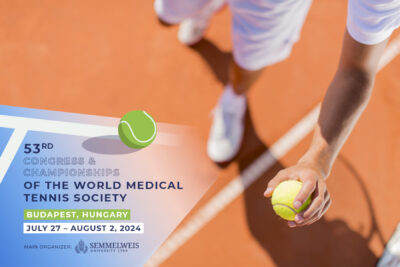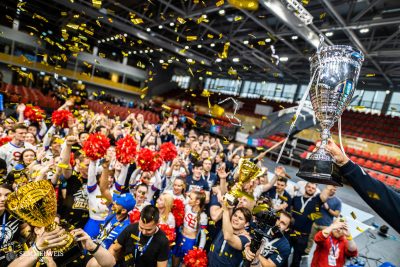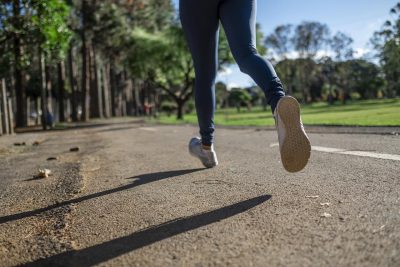On 8 August, the 32nd Summer Olympic Games in Tokyo ended with an official closing ceremony. The Hungarian Olympic Team participated in the games with 175 people and was ranked 15th in the final medal count. Semmelweis University has been involved in the medical preparation of athletes in several sports, and some of the university’s staff members have assisted the teams’ successful performance on site. Dr. Béla Merkely, Rector participated in the Olympic Aquatics competitions as member of the International Swimming Federation (FINA) Sports Medicine Committee. In the first part of our article, the Rector talked about the cooperation between the university and sports associations, as well as his experience gained on site. In the second part of the article, we interviewed physicians of the Department of Sports Medicine and the Department of Cardiology of the Városmajor Heart and Vascular Center, Semmelweis University, who performed their duties related to sports medicine for the Hungarian Olympic Team members and the individual national teams. Dr. András Tállay, Dr. Attila Pavlik, Dr. Nóra Sydó, Dr. Zsolt Komka and Dr. Tamás Halasi will share their experiences.
Dr. András Tállay, Assistant Professor of the Department of Sports Medicine, President of the Medical Committee of the Hungarian Olympic Committee, Chief Physician and Deputy Team Leader of the Hungarian Olympic Team
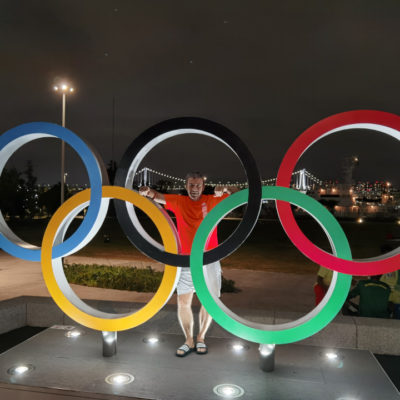 In which competitions were you involved as a physician? What were the most important tasks? What was the biggest professional challenge?
In which competitions were you involved as a physician? What were the most important tasks? What was the biggest professional challenge?
As the chief physician of the Hungarian Olympic Team, I was after all involved in all events, but I personally participated as a physician in the competitions of triathlon, mountain biking, surfing, sailing, tennis, weightlifting and wrestling. The biggest challenge was to achieve that the health state of two athletes becomes suitable for participating in competitions. One of them was Bence Bicsák, an athlete in triathlon, who arrived at the Olympics injured, and the other athlete is Anna Márton, a swordswoman. Being able to successfully assist them with this was a great pleasure.
Have you had any experience and observation in your own professional field that may be connected to the Tokyo Olympics?
During my eighth Olympic participation, it was an important observation related to sports medicine that the number of upper respiratory and gastrointestinal diseases was much lower than usual because of the measures introduced due to the COVID-19 pandemic. The latter was helped by a preventive measure that we also recommended for our athletes: starting taking probiotics at least a week before the journey.
The Olympic Games, which were held without spectators for safety reasons, inevitably brought a different atmosphere, different competitions compared to the previous games. The fellow athletes and members of the team also played the role of supporters. What new experiences has this situation brought?
Hopefully there will not be more games like these. It was unusual that in addition to almost every coaching instruction, even the noise of footsteps could be heard during a match. There were several athletes who personally thanked us for the support, as they were able to see and hear us perfectly well in the absence of the crowd.
If you had the opportunity to write only one sentence on a postcard summing up the memories of Tokyo, what would it be?
First, I did not believe it, but in the end I think that it was a great Olympic event, it was worth holding it.
Dr. Attila Pavlik, Assistant Professor of the Department of Sports Medicine, future President of the Hungarian Society for Sports Medicine
 In which competitions were you involved as a physician? What were the most important tasks? What was the biggest professional challenge?
In which competitions were you involved as a physician? What were the most important tasks? What was the biggest professional challenge?
I worked primarily with the women’s water polo team and the table tennis team, but I also tried to keep a close eye on the events of the women’s handball team and sailing. I would not single out a specific medical case from the competitions.
Have you had any experience and observation in your own professional field that may be connected to the Tokyo Olympics?
Fortunately, there were far fewer illnesses related to infections than usual, probably because of mask wearing and the regular disinfection due to COVID-19.
The Olympic Games, which were held without spectators for safety reasons, inevitably brought a different atmosphere, different competitions compared to the previous games. The fellow athletes and members of the team also played the role of supporters. What new experiences has this situation brought?
In the absence of the usual noise of supporters, of course, it was much easier to communicate with the athletes during the matches compared to previous competitions. It was interesting to experience that the players’ communication among each other was also audible, but the lack of spectators significantly had an effect on the atmosphere of the competitions.
If you had the opportunity to write only one sentence on a postcard summing up the memories of Tokyo, what would it be?
We were able to take part in much more enjoyable Olympic Games than expected, the performance of the athletes was truly fantastic.
Dr. Nóra Sydó, Assistant Lecturer of the Department of Cardiology and the Department of Sports Medicine, Sports Physician of the Hungarian Swimming Team
 In which competitions were you involved as a physician? What were the most important tasks? What was the biggest professional challenge?
In which competitions were you involved as a physician? What were the most important tasks? What was the biggest professional challenge?
As a physician for our national swimming team, I participated in their competitions. Unfortunately, due to the strict COVID-19 regulations, I did not have the opportunity to attend other competitions, but it would not have fit into my tight schedule, as I had the largest team, I had a total of 34 athletes. The preliminaries were held in the afternoons and the finals were held in the mornings, which was unusual as it used to be just the other way round in all swimming competitions. Therefore, all athletes had to be in top form already by morning.
Fortunately, no major illnesses occurred among swimmers. In my opinion, this was also due to the fact that all athletes traveled to Tokyo in an excellent condition. This was probably also supported by the fact that everyone had undergone a detailed sports cardiology examination earlier at the Városmajor Heart and Vascular Center, which was performed by my colleague, Dr. Emese Csulak and myself. Therefore, there was an opportunity then to correct any factors influencing the performance, if necessary.
Have you had any experience and observation in your own professional field that may be connected to the Tokyo Olympics?
I am always fascinated by the cohesion and orderliness of some of the teams. At the warm-up pool, each team has a designated place where the swimmers change clothes, warm up and prepare for the competition. The British team in front of us had separate staff to conduct the warm-up, prepare the equipment, arrange warm-up coats and other aids. Our team is also constantly developing: we have taken a dietary supplement package for the athletes prepared by our dietitian, but new ideas can always be gained from the other teams during each competition.
The Olympic Games, which were held without spectators for safety reasons, inevitably brought a different atmosphere, different competitions compared to the previous games. The fellow athletes and members of the team also played the role of supporters. What new experiences has this situation brought?
The atmosphere of the competition was obviously different, as at the 15,000-seat auditorium of the swimming pool, roughly 2,000 athletes and crew members supported the teams. Over the past year and a half, athletes have almost become accustomed to this.
If you had the opportunity to write only one sentence on a postcard summing up the memories of Tokyo, what would it be?
It was a fantastic experience to be able to participate in the 32nd Summer Olympic Games at the age of 32.
Dr. Zsolt Komka, Assistant Lecturer of the Department of Cardiology, Sports Physician of the Hungarian Kayak-Canoe Team
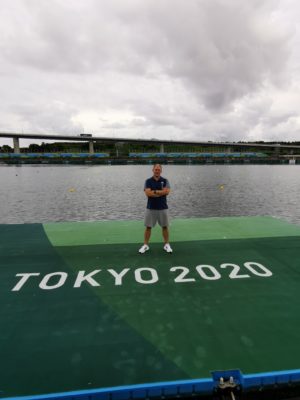 In which competitions were you involved as a physician? What were the most important tasks? What was the biggest professional challenge?
In which competitions were you involved as a physician? What were the most important tasks? What was the biggest professional challenge?
I was assigned to assist the kayak-canoe team all along. In addition to my duties of being a sports physician, I was also a COVID-19 Liaison Officer, which is a huge responsibility in the current pandemic situation. The most important special task from a medical point of view in the case of outdoor sports, such as kayak-canoe, was to help athletes with the 7-hour transition. The other priority was the optimal fluid and electrolyte replacement, as in Japan, athletes have to bring the best performance of their lives under extreme conditions. 35, even 40 Celsius degrees are not uncommon at this time of the year. Furthermore, speaking of a seaside location, the relative humidity is of 70-90%. The organizers did their best to minimize malaise: stations for refreshments were installed in many places, mist gates and air-conditioned rest rooms were available for the athletes, yet the heat gave the ambulances quite a number of tasks. The Hungarian Kayak-Canoe Team received special cooling vests from the association for testing at home. They did a really good service at the Olympic venue, and we also brought portable ice baths with ourselves. It is the responsibility of the team doctor to keep the athlete in a condition suitable for competition on the day of the competition, both physically and mentally. In addition to our large delegation of 34 people, some small problems are inevitable: the most common illnesses are upper respiratory, gastrointestinal and musculoskeletal problems and injuries. Minor illnesses still occurred, which we managed to control. All athletes were able to participate in the competitions and were able to perform as expected.
Have you had any experience and observation in your own professional field that may be connected to the Tokyo Olympics?
We have been preparing specifically for the Tokyo Olympics for several years. We traveled there in 2018 with a smaller team, and tested the training camp and the venue of the competition with 10 athletes during two weeks. We further refined our experiences at the Pre-Olympic Games in 2019, where we modeled the planned journey, training camp acclimatization, accommodations and later the competition conditions and circumstances at the Olympic venue. Based on our research results, joint Hungarian Olympic Committee recommendations were also made for 2021.
The Olympic Games, which were held without spectators for safety reasons, inevitably brought a different atmosphere, different competitions compared to the previous games. The fellow athletes and members of the team also played the role of supporters. What new experiences has this situation brought?
The training camp was significantly stricter and more closed than it was known in the pre-pandemic circumstances. In Japan, the level of population COVID-19 immunity is minimal: despite daily negative PCR tests and being asymptomatic, we were completely isolated, were transported by a separate bus everywhere. The training camp was only open to us in specific time spans, locals were not allowed to use it. Instead of spectators, the athletes were able to support each other, therefore, together with coaches and team leaders, small supporting crowds emerged. Obviously, this does not replace the atmosphere provided by a large crowd, but perhaps it strengthened the team unity a bit.
If you had the opportunity to write only one sentence on a postcard summing up the memories of Tokyo, what would it be?
“Faster, Higher, Stronger… Together.”
Dr. Tamás Halasi, Retired Lecturer of the Department of Sports Medicine, President of the Hungarian Society for Sports Medicine, Member of the Medical Committee of the Hungarian Olympic Committee
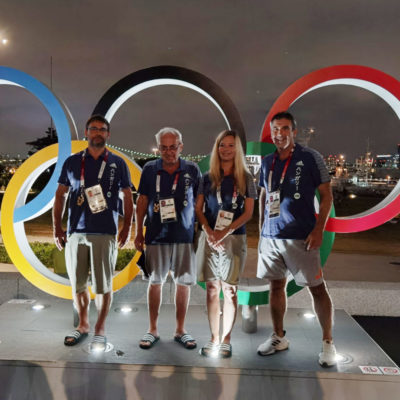 In which competitions were you involved as a physician? What were the most important tasks? What was the biggest professional challenge?
In which competitions were you involved as a physician? What were the most important tasks? What was the biggest professional challenge?
Gymnastics, wrestling and rhythmic gymnastics belonged directly to me, but I also accompanied badminton and table tennis players. As a member of the so-called central team, I was also on duty in the medical office sometimes. In some cases, we discussed the necessary treatments in the framework of a consultation, but there were very few occasions. Fortunately, I cannot report about an explicit professional challenge.
Have you had any experience and observation in your own professional field that may be connected to the Tokyo Olympics?
There were no new experiences for me, maybe because this event was already my fifth Summer Olympic Games.
The Olympic Games, which were held without spectators for safety reasons, inevitably brought a different atmosphere, different competitions compared to the previous games. The fellow athletes and members of the team also played the role of supporters. What new experiences has this situation brought?
The lack of spectators is irreplaceable. The small Hungarian group participating in the competitions, the staff and the members of the medical team did what they could.
If you had the opportunity to write only one sentence on a postcard summing up the memories of Tokyo, what would it be?
The medical activities were well prepared, calm and safe. The Olympic Games were less colourful compared to the previous games, but overall the event was successful for us.
Balázs Hiller
Photo source: Dr. András Tállay, Dr. Zsolt Komka, Dr. Attila Pavlik, Dr. Nóra Sydó
Translation: Katalin Illés-Romhányi
